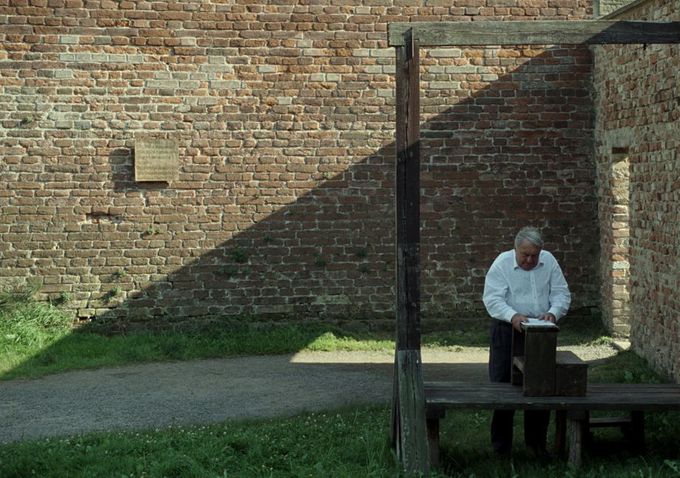 CLAUDE LANZMANN IN THE LAST OF THE UNJUST The last Jewish elder interviewed in the Seventies, with current additions
CLAUDE LANZMANN IN THE LAST OF THE UNJUST The last Jewish elder interviewed in the Seventies, with current additionsLanzmann provides a coda to his monumental Holocaust documentary,
Shoah, with this shorter but still very long study of the Viennese rabbi and Jewish scholar Benjamin Murmelstein, the last Jewish elder of Theresienstadt, whom he interviewed in Rome in the Seventies, when he was 70, a film that he has now reedited with the punctuation of judiciously added contemporary image and narration. Murmelstein in the Seventies interview film (which does not look dated at all) is still vigorous, feisty, and possessed of a remarkable memory. Lanzmann introduces the interview by saying Murmelstein "did not lie." But one eventually may question that familiar idea Murmelstein expresses that nobody he knew at the time or at Theresienstadt knew what was going on in the death camps, despite the fact, which he acknowledges, that Jews were being executed and cremated right there at the "model ghetto" of Theresienstadt that he helped run.
The newsworthy item is that Murmelstein had direct knowledge of Adolph Eichmann, whom he had dealings with before Eichman's deep involvement in the "Final Solution." Murmelstein debunks Hannah Arendt's description of Eichman as exemplifying "the banality of evil." Nothing banal about Eichman's evil, in Murmelstein's view. He says Eichman, even in his personal encounters with Murmelstein, was a "devil"; that he was also guilty of graft and exploitation of Jewish exportation to other countries for his own personal profit. Furthermore while in the Jerusalem trial there was no proof offered that Eichman took part in Kristalnacht, Murmelstein recounts directly observing him doing so, participating in the destruction of the holy objects of the largest synagogue of Vienna.
Murmelstein was viewed as a collaborator and a criminal, though he was tried and acquitted (no detail about this), and hence his book about Eichman and other testimony submitted to Israel at the time of the Eichman trial was not taken seriously by the Israelis. Murmelstein never went to Israel. The film does not explain what happened to Murmelstein's own family. He seems to have lived his life after the war in limbo, never able to go to England or America, where he says he might have had a career as a teacher and writer.
And what are we to think of Murmelstein? First of all, Lanzmann, who addresses the camera in French but interviewed Murmelstein in German, describes in detail the twisted origins and purposes of Theresienstadt, the "model ghetto" designed to function a showplace cover or facade for the concentration camps. It was presented as a safe haven for elderly Jews, but when they arrived there they were greeted with humiliation, as they were by the Nazis elsewhere. Murmelstein was the third Jewish elder who "ran" Theresienstadt under the Kommandant, after the first two were sent away and executed. How did Murmelstein survive? Is the fact that he survived heroic -- or despicable? It seems that in any case he survived because he was brave, forceful and tough, both to the Nazis and in administering the "ghetto."
Murmelstein says that his aim was the survival of Theresienstadt through cooperating with the authorities in its "embellishment," the beautifying and physical improving of the facilities, and insisting that the inhabitants work 70-hour weeks. He explains how he protected their health, getting rid of typhus and lice, and asserts that his cooperation in the 1944 propaganda film about the place was an essential step, because once it had been made known as a model place, the Nazis could not eradicate it. He admits that he was of course also saving his own skin and feeding his own ego in being a strong and effective leader -- under the Nazis.
Lanzmann's lengthy, solemn, ceremonial over-and-overing documentary process seems necessary as we eventually hang on Murmelstein's and his every word -- Murmelstsin himself a forceful, vociferous speaker who makes the viewer focus intensely on him and on the day-to-day matters of his administration and his earlier interactions with Eichman that he describes. Lanzmann's magisterial filmmaking technique today involves continual breaks showing landscapes and cityscapes of Theresienstadt and other places touched on by this document. In some of them Lanzmann stands and speaks, or reads from Murmelstein's book on Eichman, originally published in Italian, translated here into French. Unlike
Shoah, which consists exclusively of talking heads, this time Lanzmann sometimes shows contemporary images from the Thirties and Forties, including a passage from the Theresienstadt propaganda film and a photo of Murmelstein in an office with Eichmann before he became the Elder at Theresienstadt.
But just Lanzmann standing and speaking at a now clean and beautiful outdoor space around the buildings at Theresienstadt can be impressive. Particularly memorable is Lanzmann in a space, become through his art both beautiful and horrible, where dozens of young Jewish men were hanged to frighten the others, an event Lanzmann describes in detail. In his late eighties, Lanzmann today still seems forceful and monumental himself, with a sadness and moral weight the feisty, energetic, logical Murmelstein does not quite muster.
This is the ultimate portrait of moral ambiguity. Note, however, that Murmelstein had the chance earlier of emigrating to England or America, and instead chose to remain in Austria and help other Jews to emigrate, before his final wartime job at Theresienstadt. This does not keep Murmelstein from having entered into very dubious situations, to put it mildly, in becoming the last Jewish elder of Theresienstadt. This is a role in which a man will be either compromised or dead.
The Last of the Unjust/Le dernier des injustes, 218 mins., debuted at Cannes May 2013, and was screened for this review as part of the New York Film Festival at Lincoln Center, September 2013.





